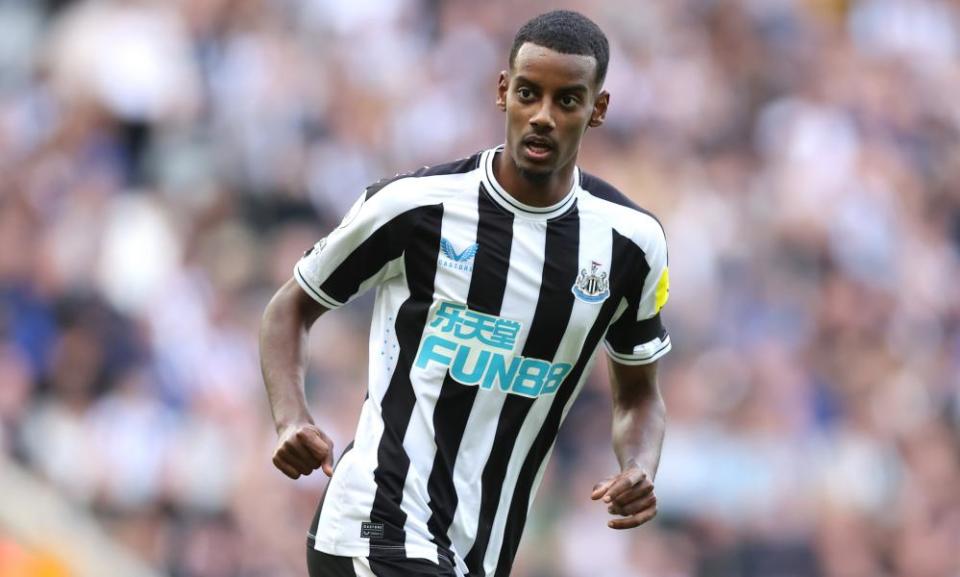No storm at Newcastle despite patchy start thanks to Howe’s calm influence
When Chris Hughton arrived at Newcastle’s training ground for the first time, the mere act of opening his car door threatened to dispatch him to the medical room.
The club’s former manager would subsequently joke that the capricious gust of wind which almost separated his right arm from its socket was a metaphor for the persistent turbulence then afflicting St James’ Park employees.
Related: Documents reveal Tory minister’s push to smooth Saudi Newcastle takeover
Almost a decade after Hughton’s eventual sacking in 2010, Steve Bruce signalled that little had changed. “There’s always a storm in Newcastle,” moaned Eddie Howe’s predecessor. “After two indifferent results there’s a so-called mini-crisis. Everything gets over-sensationalised.”
In recent months, though, something has finally changed on Tyneside. Frequent, invariably chill north-east winds still whip through Newcastle’s suburban training base but, inside a weekday HQ now benefiting from a much-needed Howe-inspired makeover, the mood is unusually calm.
It is no exaggeration to say last October’s sudden regime change – the contentious Saudi Arabian-led takeover which brought Mike Ashley’s ownership to an unlamented end – has altered the club’s mindset beyond recognition.
In previous seasons, Newcastle’s collection of a modest eight points from the campaign’s first seven games would have prompted concern among fans. This time things are very different.

Admittedly Howe is not exactly sanguine about the absence of a Premier League win since the opening-day home victory against Nottingham Forest, and a smattering of boos from the Gallowgate End greeted the recent draw against Bournemouth, but there is no sense of an impending relegation skirmish.
If anything the new peril is merely treading mid-table water. Although the £210m spent on high-calibre players including Nick Pope, Kieran Trippier, Sven Botman, Bruno Guimarães and Alexander Isak since the Saudis’ installation should offer ample insulation against the threat of Championship football, Howe could still do with the reassurance of three points at Fulham on Saturday.
Maybe he has been trying almost too hard. Perhaps significantly, a coach whose addresses to Newcastle’s players are routinely peppered with the mantra “our identity is intensity” has latterly been hampered by a raft of injuries to senior players. Training sessions are so demanding that Jonjo Shelvey reported being so exhausted last season he was in bed by 8pm most days.
Whatever the precise cause, a series of largely soft-tissue problems dictate that Shelvey, Isak, Chris Wood, Guimarães, Allan Saint-Maximin and Callum Wilson are among 10 players sidelined in recent weeks.
The high-calibre improvisation and incision offered by the absent Saint-Maximin and Wilson largely explains Newcastle’s failure to threaten Bournemouth from open play, emphasising precisely why their manager is keen to add creativity in the shape of the Leicester midfielder James Maddison and the Leeds winger Jack Harrison in January.
By then some pundits suspect Howe may have replaced Gareth Southgate as England manager but others doubt a workaholic 44-year-old who regularly pulls into his training ground parking space shortly after 6am would relish the largely “hands off” international coaching lifestyle.
Although Howe’s future could ultimately hinge on how well his family settle on Tyneside after their relocation from Bournemouth, the indications are he is at St James’ for the long haul and has fully bought into the project of transforming Newcastle into Champions League contenders.
Moreover, given that he only recently signed a long-term contract extension and his deal is understood to contain no special release clauses, he would be extremely expensive to poach.
After achieving “mission near-impossible” last season and preventing a team who were without a win when Bruce departed in November from falling into the second tier, Howe also has considerable credit in the bank.
As much as the Newcastle hierarchy continue to admire Rafael Benítez, their original first choice, and appreciate that Leicester’s Brendan Rodgers has not become a bad manager overnight, they appear delighted with Howe and understand it will take him time to properly implement his philosophy.
Until his arrival Newcastle were a low-possession, counterattacking outfit and their ongoing stylistic transition partly explains why, despite some good performances, their points tally remains relatively skinny.
Despite enjoying what would once have been an unprecedented 72% of possession against Bournemouth, Howe’s players often did not seem quite sure what to do with the ball. “We’ve got to be better in possession,” he admits. “We’ve got to be more creative and show a bit more patience.”
In its way Newcastle’s tactical metamorphosis is almost as radical as their manager’s switch from the smart black suit he wore for the minute’s silence in honour of the late Queen before the Bournemouth game to the black tracksuit he, somewhat manically, clambered into at kick-off.
It seemed the most appropriate uniform for a quintessential “mud-on-boots” coach whose reinvention of Joelinton from a non-scoring £40m striker to a Patrick Vieira-esque midfielder must now be followed by the accomplishment of two more similarly tricky tasks.
The need to refine the £60m Isak’s sometimes naive attacking game is rivalled only by an imperative to pull off the enduring challenge of turning the high-maintenance Saint-Maximin into the world-class talent his raw talent demands.
Pass those two tests and Howe will not only earn a place at football’s top table, but almost certainly lead Newcastle into Europe.

 Yahoo Sport
Yahoo Sport 





































